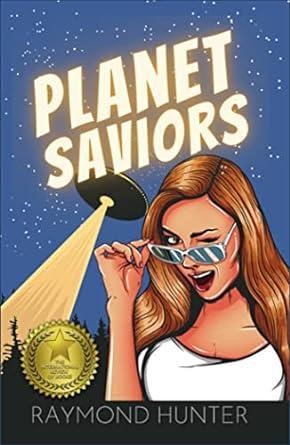Writing a science fiction bestseller requires a blend of creativity, technical knowledge, and storytelling prowess. Here are some key science fiction writing tips to help you elevate your sci-fi manuscript from draft to finished work and captivate your readers.
Key Science Fiction Writing Tips for Your Next Bestseller
Master the Basics
Before diving into the complexities of sci-fi, ensure you have a strong grasp of basic writing skills. This includes grammar, punctuation, and narrative structure.
Use clear and concise language to convey complex ideas. Ensure your sentences flow smoothly and avoid jargon that might confuse readers.
Create Compelling Characters
Characters are the heart of your story. Develop well-rounded, relatable characters that readers can connect with, even in a futuristic setting.
Give your protagonist a mix of strengths and flaws. Show their growth and challenges as they navigate your sci-fi world.
For instance, Raymond Hunter’s latest sci-fi masterpiece, “Planet Saviors,” follows Stella, who’s smarter than she seems but naive and innocent in many ways. Her journey on Earth to find a cure for Mundians makes this novel an adventurous read.

Build a Gripping Plot
A strong plot keeps readers engaged. Outline your story’s main events, twists, and resolutions to ensure a coherent and compelling narrative.
Introduce a central conflict early on. Build tension through obstacles and climaxes, leading to a satisfying resolution.
Incorporate Scientific Accuracy
While creativity is crucial, grounding your story in scientific plausibility can enhance its believability. Research relevant scientific concepts and technologies.
If your story involves space travel, understand the basics of astrophysics and spaceflight. This adds credibility to your narrative.
Balance Technology and Humanity
Technology should enhance your story, not overshadow it. Balance technical descriptions with human elements to keep readers emotionally invested.
Show how technology impacts your characters’ lives and emotions. This creates a more immersive and relatable story.
Explore Deep Themes
Great sci-fi often delves into profound themes like identity, morality, and the human condition. Use your narrative to explore these themes in a meaningful way.
Consider themes like the ethical implications of artificial intelligence or the consequences of genetic engineering. Weave these themes into your plot and character arcs.
Maintain Consistency
Consistency is key to maintaining your readers’ suspension of disbelief. Ensure your world-building, character behavior, and plot developments align throughout the story.
If you’ve established that teleportation exists, consider its impact on various aspects of life and integrate it consistently into your narrative.
Show, Don’t Tell
Show, don’t tell is a fundamental writing principle. Use descriptive scenes and actions to convey information instead of exposition.
Instead of stating that a character is brave, show them facing and overcoming a daunting challenge.
Edit and Revise
Writing is rewriting. Revise your manuscript multiple times to polish your story, tighten the narrative, and eliminate errors.
Seek feedback from beta readers and professional editors. Their insights can help you refine your manuscript and catch overlooked issues.
Stay Inspired
Writing a sci-fi bestseller is a marathon, not a sprint. Stay inspired by reading widely, engaging with the sci-fi community, and continuously honing your craft.
Attend sci-fi conventions, join writing groups, and read both classic and contemporary sci-fi to keep your creative juices flowing.
Order “Planet Saviors” by Raymond Hunter Today!
Elevate your science fiction writing with these essential tips.
For more inspiration and practical insights, dive into “Planet Saviors” by Raymond Hunter. This novel is a masterclass in sci-fi storytelling and will fuel your creativity.
Order your copy today and start crafting your next bestseller!




